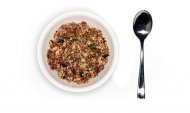 One of the worst things about the sport of triathlon is the typical 7:00 am start time of races. It wouldn’t be so bad if you could wake up in a room located within walking distance of the start line at 6:50, step outside, and go, but that doesn’t work.
One of the worst things about the sport of triathlon is the typical 7:00 am start time of races. It wouldn’t be so bad if you could wake up in a room located within walking distance of the start line at 6:50, step outside, and go, but that doesn’t work.
Trust me, I’ve tried it. Several years ago I raced the Los Angeles Triathlon. The night before the competition I stayed with a friend who happened to live within walking distance of the start line in Santa Monica. Somehow I managed to sleep through two alarms. When my host came into my room to rouse me, it was 10 minutes before my wave start time. I threw myself together, dashed out the door and sprinted to the beach. Having missed my wave, I joined the next, the only blue swim cap-wearing fool in a sea of green swim caps.
I did not have a good race. The main problem was not that I had missed my usual warm-up or that I simply hadn’t been awake long enough to function well; it was that I had been forced to skip breakfast.
The pre-triathlon meal is important. It has a couple of important jobs to do. The first job is bringing your liver glycogen stores and blood glucose concentration up to top levels. During the night your body’s precious carbohydrate fuel stores are reduced by your nervous system, which runs on glucose. Therefore when you wake up after the overnight fast your liver glycogen stores and blood glucose concentration have been brought down to levels that are less than optimal for finishing a triathlon. But a high-carbohydrate meal can restore those fuel reserves in a jiffy.
When you wake up in the morning your body is also not in the ideal hormonal state for racing. In Hardwired for Fitness, authors Robert Portman and John Ivy point out that, first thing in the morning, before breakfast, large amounts of the stress hormone cortisol are flowing through the body. A high-carbohydrate meal brings cortisol levels down and releases insulin, the fuel-injection hormone that delivers carbs to working muscles during a triathlon.
It takes a fairly large amount of carbohydrate to do these jobs optimally. Research supports 150 grams, or 600 calories, of carbohydrate intake in the pre-triathlon meal. The problem is that it takes a little time to digest and absorb that much food, and it is important that the pre-race meal be cleared from the stomach before the race starts, or you’re likely to experience GI distress during the race. Most experts recommend consuming a pre-triathlon meal of that size three hours before the race start. That means 4:00 am, if your wave starts at 7:00. Ouch!
Source: triathlon.competitor.com

|
IamTee Womans I Eat Hills for Breakfast T-Shirt-Green-XXL Apparel ()
|
























